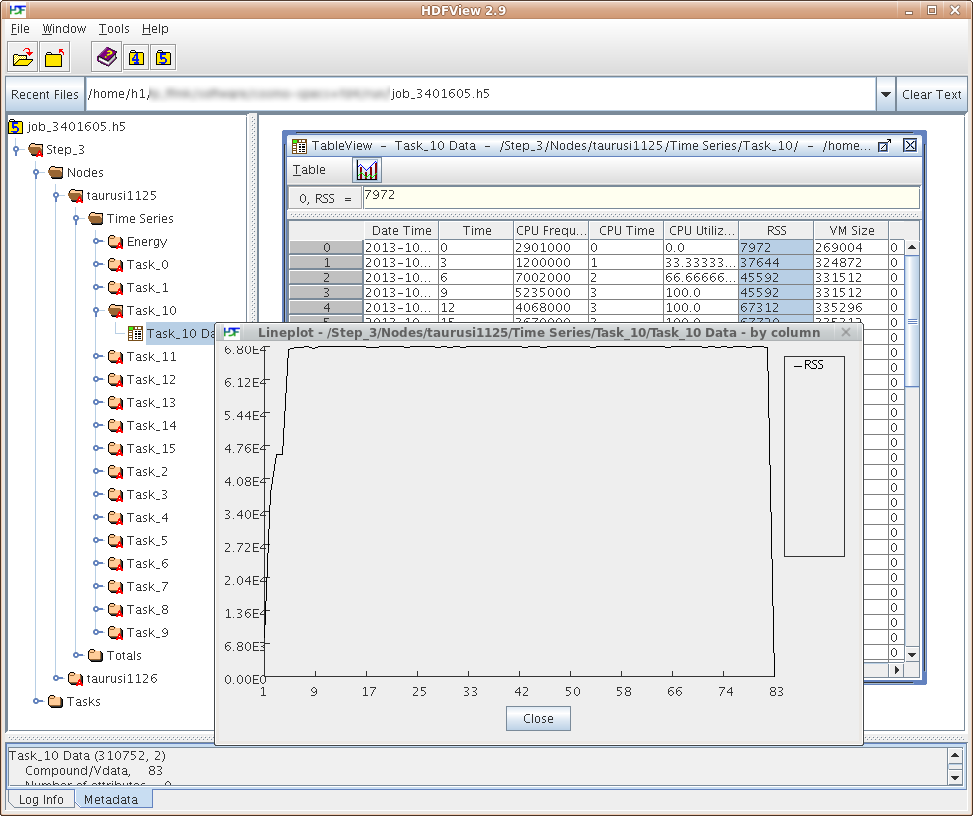Job Profiling (Outdated)¶
2022-05-24
After upgrading to Slurm 20.11.9 job profiling is not working. We looking forward to activate job profiling with the next Slurm version again. The plan is to upgrade within the next weeks to Slurm 21.08.X.
Slurm offers the option to gather profiling data from every task/node of the job. Analyzing this data allows for a better understanding of your jobs in terms of elapsed time, runtime and I/O behavior, and many more.
The following data can be gathered:
- Task data, such as CPU frequency, CPU utilization, memory consumption (RSS and VMSize), I/O
- Energy consumption of the nodes
- InfiniBand data (currently deactivated)
- Lustre filesystem data (currently deactivated)
The data is sampled at a fixed rate (i.e. every 5 seconds) and is stored in a HDF5 file.
Data hygiene
Please be aware that the profiling data may be quiet large, depending on job size, runtime, and
sampling rate. Always remove the local profiles from /lustre/scratch2/profiling/${USER},
either by running sh5util as shown above or by simply removing those files.
Examples¶
The following examples of srun profiling command lines are meant to replace the current srun
line within your job file.
Create profiling data
(--acctg-freq is the sampling rate in seconds)
# Energy and task profiling
srun --profile=All --acctg-freq=5,energy=5 -n 32 ./a.out
# Task profiling data only
srun --profile=All --acctg-freq=5 -n 32 ./a.out
Merge the node local files
... in /lustre/scratch2/profiling/${USER} to single file.
# (without -o option output file defaults to job_$JOBID.h5)
sh5util -j <JOBID> -o profile.h5
# in jobscripts or in interactive sessions (via salloc):
sh5util -j ${SLURM_JOBID} -o profile.h5
View data
marie@login$ module load HDFView
marie@login$ hdfview.sh profile.h5

More information about profiling with Slurm:
Memory Consumption of a Job¶
If you are only interested in the maximal memory consumption of your job, you don't need profiling at all. This information can be retrieved from within job files as follows:
#!/bin/bash
#SBATCH [...]
module purge
module load [...]
srun a.exe
# Retrieve max. memory for this job for all nodes
srun max_mem.sh
The script max_mem.sh is:
#!/bin/bash
echo -n "$(hostname): "
cat /sys/fs/cgroup/memory/slurm/uid_${SLURM_JOB_UID}/job_${SLURM_JOB_ID}/memory.max_usage_in_bytes
Note
- Make sure that the script
max_mem.shis executable (e.g.,chmod +x max_mem.sh) and add the path to this script if it is not within the same directory. - The
sruncommand is necessary to gather the max. memory from all nodes within this job. Otherwise, you would only get the data from one node.